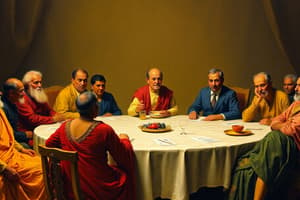Podcast
Questions and Answers
Questions are hidden until you start the quiz
Flashcards
Look East Policy
Look East Policy
India formally announced its Look East Policy in the early 1990s, aiming to strengthen relationships with Southeast Asian nations.
Act East Policy
Act East Policy
The 'Act East Policy' is a continuation and evolution of the Look East Policy, aiming to strengthen political, economic, and cultural ties with Southeast Asian nations. It was initiated by Prime Minister Narendra Modi.
ASEAN
ASEAN
The Association of Southeast Asian Nations (ASEAN) is a political and economic organization of 10 Southeast Asian countries, founded in 1967.
Paris Agreement
Paris Agreement
Signup and view all the flashcards
Tashkent Agreement
Tashkent Agreement
Signup and view all the flashcards
Human Security
Human Security
Signup and view all the flashcards
Garibi Hatao
Garibi Hatao
Signup and view all the flashcards
First Indian Governor-General
First Indian Governor-General
Signup and view all the flashcards
State of Emergency
State of Emergency
Signup and view all the flashcards
States Reorganization Act
States Reorganization Act
Signup and view all the flashcards
Warsaw Pact
Warsaw Pact
Signup and view all the flashcards
SAARC Headquarters
SAARC Headquarters
Signup and view all the flashcards
Dalit Panther Movement
Dalit Panther Movement
Signup and view all the flashcards
Chipko Movement
Chipko Movement
Signup and view all the flashcards
Narmada Bachao Andolan
Narmada Bachao Andolan
Signup and view all the flashcards
Total Revolution
Total Revolution
Signup and view all the flashcards
India's First Nuclear Test
India's First Nuclear Test
Signup and view all the flashcards
Fall of the Berlin Wall
Fall of the Berlin Wall
Signup and view all the flashcards
Cuban Missile Crisis
Cuban Missile Crisis
Signup and view all the flashcards
Soviet Invasion of Afghanistan
Soviet Invasion of Afghanistan
Signup and view all the flashcards
NIEO
NIEO
Signup and view all the flashcards
SAFTA
SAFTA
Signup and view all the flashcards
Agenda 21
Agenda 21
Signup and view all the flashcards
Sustainable Development
Sustainable Development
Signup and view all the flashcards
Global South
Global South
Signup and view all the flashcards
Global Security
Global Security
Signup and view all the flashcards
Operation Infinite Reach
Operation Infinite Reach
Signup and view all the flashcards
Operation Enduring Freedom
Operation Enduring Freedom
Signup and view all the flashcards
Operation Iraqi Freedom
Operation Iraqi Freedom
Signup and view all the flashcards
Kamraj Plan
Kamraj Plan
Signup and view all the flashcards
United Nations
United Nations
Signup and view all the flashcards
Treaty of Maastricht
Treaty of Maastricht
Signup and view all the flashcards
Bombay Plan
Bombay Plan
Signup and view all the flashcards
NSG
NSG
Signup and view all the flashcards
Cold War
Cold War
Signup and view all the flashcards
Instrument of Accession
Instrument of Accession
Signup and view all the flashcards
Self-Respect Movement
Self-Respect Movement
Signup and view all the flashcards
Study Notes
Important Dates and Events
- Paris Climate Agreement ratification by India: October 2, 2016
- Operation Polo: Launched to merge/annex princely states into India
Human Security
- Definition: Focuses on protecting people over states, and encompassing threats beyond war, like hunger, disease, and natural disasters.
- Traditional Notion of security: Concerned with protection of the state only.
Garibi Hatao Slogan
- Political Strategy: Associated with the Congress party's political strategy.
Governor General of India
- First Indian: C. Rajagopalachari
State of Emergency
- Article: 352 of the Indian Constitution
- Date: June 25, 1975
States Reorganisation Act of 1956
- Result: Created 14 states and 6 union territories
Warsaw Pact
- Purpose: Part of Eastern Alliance's efforts to counter NATO's influence in Europe.
Tashkent Agreement
- Signatories: India and Pakistan
SAARC Headquarters
- Location: Kathmandu
Dalit Panthers Movement
- State: Maharashtra
Nuclear Testing
- India's First Test: 1974
Fall of Berlin Wall
- Year: 1962
NIEO (New International Economic Order)
- Year: 1979
SAFTA (South Asian Free Trade Area)
- Implementation Date: January 1, 2006
Agenda-21
- Focus: Climate change, biodiversity and forestry.
ASEAN Members
- Number: 10
Perestroika
- Definition: Economic and political reform policies of the former USSR.
Sustainable Development
- Emerged During: The Rio Summit, 1992
Global South
- Definition: Group of developing countries.
Emergency Censorship
- Article: 19(1) (a) of Indian Constitution deals with freedom of speech and expression.
First UN Secretary-General
- Name: Trygve Lie
Bombay Plan
- Focus: Industrial economic development of India.
Studying That Suits You
Use AI to generate personalized quizzes and flashcards to suit your learning preferences.




